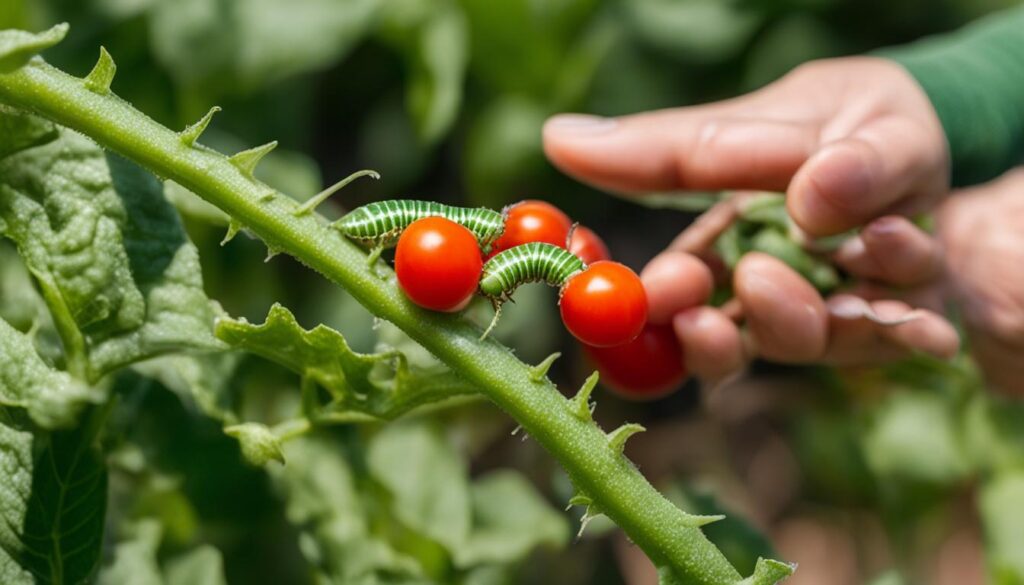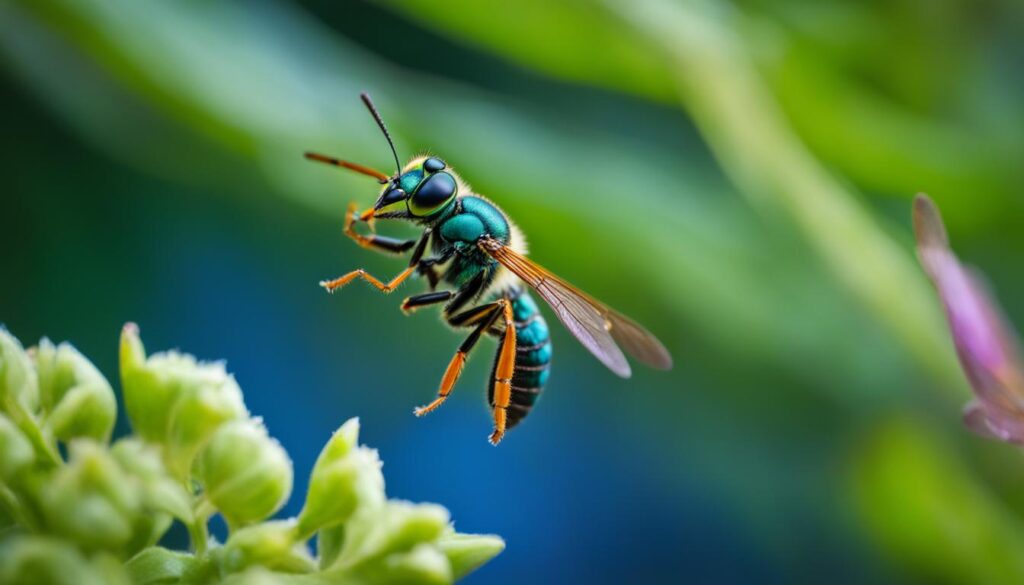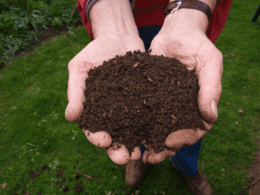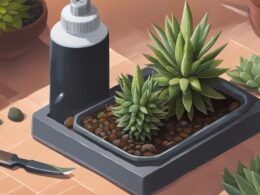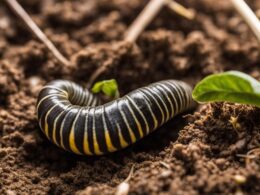Hornworms, specifically tomato hornworms, are voracious caterpillars that can cause significant damage to plants in your garden. To prevent hornworm infestations, there are several effective tips you can follow. These tips include inspecting your plants regularly for signs of hornworms, picking off caterpillars by hand, attracting natural predators like braconid wasps, planting companion plants that deter hornworms, using bacterial control with Bacillus thuringiensis, and cultivating the soil to disrupt hornworm pupae. By implementing these strategies, you can protect your garden from hornworm damage and keep your plants healthy.
Key Takeaways:
- Regularly inspect your plants to detect hornworm infestations early.
- Handpick hornworms off your plants as an effective organic control method.
- Attract natural predators like braconid wasps to naturally control hornworm populations.
- Plant companion plants such as basil and borage to deter hornworms.
- Use Bacillus thuringiensis (Bt), a bacterial control, to effectively combat hornworms.
Inspect Your Plants Regularly for Hornworms
In order to effectively prevent hornworm infestations in your garden, it is important to regularly inspect your plants for any signs of these destructive caterpillars. Hornworms, especially tomato hornworms, are notorious for blending in with the foliage, making them difficult to spot. By keeping a close eye on your plants, you can catch hornworm infestations early and take action to prevent them from causing extensive damage.
When inspecting your plants, look for V-shaped white markings on the caterpillars’ bodies and their distinctive black horns. These markings are key identifiers of hornworms. Additionally, be on the lookout for chewing damage on leaves and the presence of dark green droppings, known as frass. These signs indicate that hornworms are present and feeding on your plants.
“Regularly inspecting your plants is crucial in detecting hornworm infestations early.”
By incorporating a routine plant inspection into your gardening practices, you can effectively detect and prevent hornworm infestations from getting out of hand. Remember to thoroughly examine both sides of the leaves and inspect the entire plant, including the stems and undersides of the foliage where hornworms tend to hide.
Benefits of Regular Plant Inspection:
- Early detection of hornworm infestations
- Prevention of extensive damage to your plants
- Opportunity to take immediate action against hornworms
- Maintaining the overall health of your garden
Regularly inspecting your plants is an essential step in effectively preventing hornworm infestations. By staying vigilant and taking proactive measures, you can protect your garden and enjoy healthy, thriving plants.
Handpick Hornworms Off Your Plants
When it comes to dealing with hornworms, one of the most effective and organic methods is to handpick them off your plants. This method allows you to remove the caterpillars manually, preventing them from causing extensive damage to your garden.
To handpick hornworms, start by inspecting your plants regularly for any signs of infestation. Look for the distinctive V-shaped white markings and black horns on the caterpillars’ bodies. You may also notice chewing damage and dark green droppings on the leaves. Once you spot a hornworm, simply pick it off the plant using gloves if preferred, and dispose of it in a pail of soapy water or by squishing it.
Handpicking hornworms is a simple and effective way to control their population without the use of harmful chemicals. By regularly checking your plants and removing hornworms promptly, you can preserve the health of your garden and ensure the well-being of your plants.
Attract Natural Predators like Braconid Wasps
When it comes to dealing with hornworms in your garden, attracting natural predators like braconid wasps can be a highly effective method. These non-stinging parasitic wasps are natural enemies of hornworms and can help control their populations. By encouraging the presence of braconid wasps in your garden, you create a natural balance and reduce the need for chemical interventions.
One way to attract braconid wasps is by growing plants that produce small, nectar-rich flowers. Sweet alyssum, chamomile, yarrow, and catmint are excellent choices. These flowers serve as a food source for adult braconid wasps, attracting them to your garden. Additionally, dill and fennel, which are members of the carrot family, can also help attract these beneficial insects.
By planting these companion plants alongside your vegetable crops, you not only deter hornworms but also create an inviting habitat for braconid wasps. These tiny warriors will lay their eggs under the hornworm’s skin, leading to the eventual demise of the pest. This natural control method is both effective and environmentally friendly, promoting a healthy garden ecosystem.
Plant Companion Plants that Deter Hornworms
One effective strategy for preventing hornworm infestations in your garden is to plant companion plants that naturally deter these destructive caterpillars. Companion planting involves growing certain plants alongside your vegetable crops to enhance their growth and repel pests. In the case of hornworms, there are several companion plants that can help deter their presence.
“Companion planting involves growing certain plants alongside your vegetable crops to enhance their growth and repel pests.”
Companion Plants to Consider
- Basil: Planting basil alongside your tomato plants can help repel hornworms as well as other insects like thrips and aphids. The strong scent of basil acts as a natural deterrent.
- Borage: Borage is an excellent companion plant that not only repels hornworms but also attracts beneficial bees and wasps. Its cucumber-flavored leaves and attractive blue flowers make it a valuable addition to your garden.
- Marigolds: Marigolds have strong-smelling essential oils that can help repel the hawk moth, which lays hornworm eggs. Including marigolds in your garden can create a barrier against these voracious caterpillars.
By incorporating these companion plants into your garden, you can create an environment that is less attractive to hornworms. The strong scents and natural deterrents of these plants can help protect your vegetable crops and maintain a healthy garden ecosystem.
Use Bacterial Control with Bacillus thuringiensis (Bt)
Bacillus thuringiensis (Bt) is a highly effective bacterial control method for managing hornworm infestations in your garden. This natural insecticide specifically targets caterpillars and worms without harming beneficial insects like bees. Bt works by paralyzing the hornworms’ digestive systems, eventually leading to their demise.
When using Bt, make sure to select the Bacillus thuringiensis kurstaki strain (Btk), as it is most effective against caterpillars. This bacterial control method is safe to use on tomatoes and other food crops, as long as the produce is washed before consumption. To maintain its effectiveness, it is crucial to apply Bt every 5 to 7 days.
Benefits of Using Bacillus thuringiensis (Bt)
- Bt is a natural alternative to chemical pesticides, making it an environmentally friendly choice for gardeners.
- It specifically targets hornworms and other caterpillar pests, reducing the risk of harm to beneficial insects.
- Using Bt allows you to effectively control hornworm infestations without compromising the quality of your harvest.
“Bacillus thuringiensis (Bt) is a safe and effective control method for hornworms. When used correctly, it can help protect your plants and promote a healthy garden ecosystem.”
By incorporating Bt into your hornworm management plan, you can effectively control these destructive pests and ensure the health and vitality of your garden.
Conclusion
In conclusion, preventing hornworms in your garden is essential to maintain the health and vitality of your plants. By implementing these natural control methods, you can effectively protect your garden from hornworm infestations.
Regularly inspecting your plants for signs of hornworms is the first step in prevention. By being vigilant and attentive, you can detect these pests early and take action before they cause extensive damage.
Handpicking hornworms off your plants is a simple and organic method of control. By removing them promptly, you can prevent further destruction and minimize the risk of infestation.
Attracting natural predators like braconid wasps and planting companion plants that deter hornworms are effective ways to maintain a balanced ecosystem in your garden. These beneficial insects and plants work together to control hornworm populations naturally.
Using bacterial control with Bacillus thuringiensis (Bt) is another effective method to consider. This natural bacterial insecticide specifically targets hornworms, ensuring a safe and environmentally friendly approach to pest management.
By following these natural control methods, you can create a garden that is resilient to hornworm infestations. Protecting your plants from these voracious caterpillars will result in a thriving garden that you can enjoy throughout the season.
Can the Tips for Preventing Hornworms in the Garden Also Be Used to Prevent Worms in Squash?
Yes, the effective solutions for squash worms can also be used to prevent hornworms in the garden. Applying natural insect repellents, planting companion plants, and practicing good garden hygiene are all effective methods for keeping both types of worms at bay in your garden.
FAQ
How can I prevent hornworms from infesting my garden?
There are several effective tips you can follow to prevent hornworm infestations in your garden. These include regularly inspecting your plants for signs of hornworms, handpicking the caterpillars off your plants, attracting natural predators like braconid wasps, planting companion plants that deter hornworms, using bacterial control with Bacillus thuringiensis (Bt), and cultivating the soil to disrupt hornworm pupae.
How do I inspect my plants for hornworms?
To inspect your plants for hornworms, look for V-shaped white markings on the caterpillars’ bodies and distinctive black horns. Chewing damage and dark green droppings (frass) left on the leaves are also signs of hornworm presence. Regularly monitoring your plants will help you detect hornworm infestations early.
What is the best way to control hornworms organically?
Handpicking hornworms off your plants is one of the most effective and organic methods of control. Simply pick them off your plants and either drown them in a pail of soapy water or squish them. Wearing gloves can help with any squeamishness. By regularly checking your plants and promptly removing hornworms, you can prevent extensive damage.
How can I attract braconid wasps to my garden?
To attract braconid wasps, grow plants that produce small, nectar-rich flowers such as sweet alyssum, chamomile, yarrow, and catmint. Dill and fennel, members of the carrot family, can also attract these beneficial insects. Braconid wasps are natural enemies of hornworms and lay their eggs under the skin of the caterpillars. The wasp larvae feed on the hornworms, eventually killing them.
What companion plants can deter hornworms?
Basil, when grown alongside tomato plants, is known to repel hornworms as well as other destructive insects like thrips and aphids. Borage, with its cucumber-flavored leaves and attractive blue flowers, acts as a powerful hornworm repellent and also attracts beneficial bees and wasps. Marigolds, with their strong-smelling essential oils, can help repel the hawk moth that lays hornworm eggs.
How does Bacillus thuringiensis (Bt) control hornworms?
Bacillus thuringiensis (Bt) is a natural bacterial insecticide that effectively controls hornworms. When applied to foliage, Bt paralyzes the hornworms’ digestive systems, leading to their death. It is safe to use on tomatoes and other food crops if the fruit is washed before consumption. Look for Bacillus thuringiensis of the kurstaki strain (Btk), which targets caterpillars and worms without harming beneficial insects like bees.
How can I prevent hornworm infestations and protect my plants?
By implementing the effective tips mentioned above, such as regularly inspecting your plants, handpicking hornworms, attracting natural predators, planting companion plants, using bacterial control, and cultivating the soil, you can effectively prevent hornworm infestations and protect your plants. These natural control methods are safe for the environment and promote a healthy garden ecosystem.







